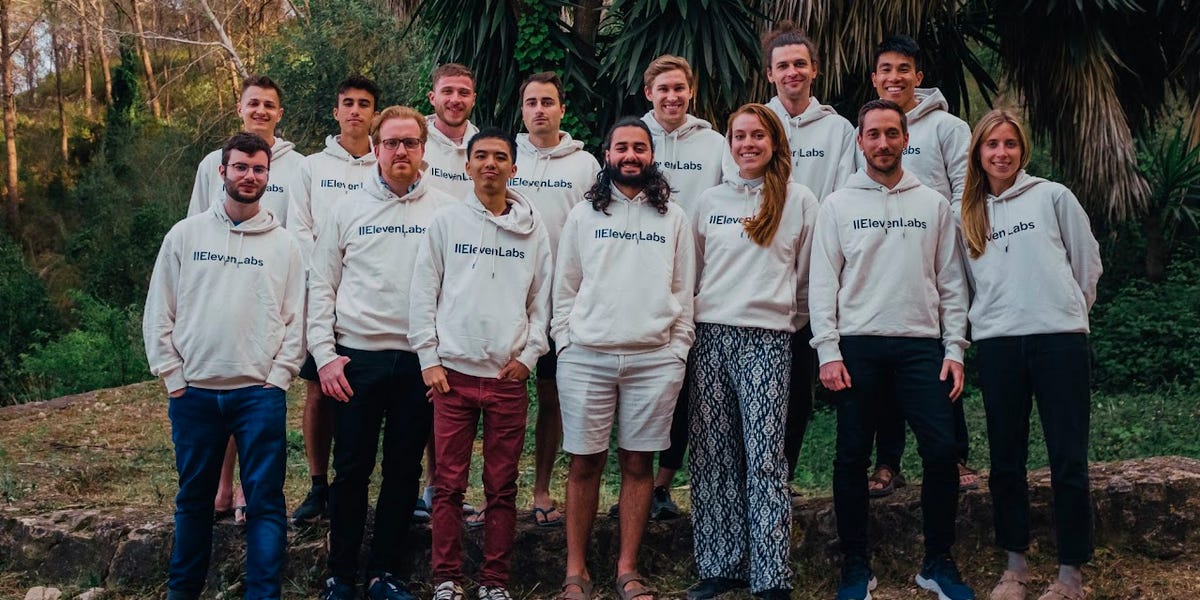ElevenLabs, a generative AI startup focused on voice, is in talks to raise capital in a deal that would catapult its valuation to $1 billion.
The London and New York-based startup, founded last year by ex-Google and Palantir staffers, has received term sheets from existing investor Andreessen Horowitz and VC giant Sequoia for what would be its third funding round of 2023, three sources familiar with proceedings told Insider.
It is unclear as yet whether Sequoia would invest alongside Andreessen Horowitz or if they are competing with one another.
The deal is not yet finalized and details around valuation and participants could still change. Sources spoke to Insider on condition of anonymity as details of the deal are still private.
On Tuesday, AI and big data newsletter Supervised reported that ElevenLabs was in talks to raise a substantial new round that could make it a unicorn.
ElevenLabs uses AI to turn text into speech, recreating human voices in the process. The tool only needs a few minutes of audio of someone speaking to clone their voice. Users can then dub that voice to speak in 29 different languages.
The startup has touted use cases like video narration or non-playable character dialogue for video games but voice cloning has already been deployed for more disingenuous reasons, which has already been a problem for the company.
ElevenLabs’ tech rose to prominence in January when Vice reported it had been used to vocalize hateful comments in the voices of celebrities like Joe Rogan and Emma Watson.
The company has since launched a deepfake detection tool. It has also brought in new controls to ensure users can only recreate their own voice by making them read a captcha prompt that is then checked against the sample submitted, Gizmodo reported.
The company raised a $19 million Series A round in June, which valued the business at $100 million. Five months on, the prospective new round will increase that valuation 10 times over to $1 billion, three sources said.
ElevenLabs and Andreessen Horowitz did not respond to a request for comment. Sequoia declined to comment when contacted by Insider.
Such a deal would be a remarkable rate of growth for an early-stage startup, pulling it past a unicorn valuation faster than tech giants like Meta and Airbnb.
But such rapid increases are becoming more common in 2023 against a backdrop of fervent investor attention in generative AI startups since the launch of OpenAI’s ChatGPT last November.
This investor FOMO has led to venture capitalists writing massive checks to small, often months-old startups, that have designs on becoming the next Google or Apple of AI. French startup Mistral is another such example with Andreessen Horowitz also in talks to fund a $400 million round into the six-month-old company that would value it at up to $2.5 billion, Insider reported last week.
ElevenLabs has been on a growth tear in 2023, having launched a variety of new products including an enterprise product and a second version of its ‘Turbo’ text-to-speech offering with lower latency.
Similarly, the company has a long-form video content offering called ‘Projects,’ a workflow tool created to edit long-form audio content.
Since launching its beta at the start of 2023, it now counts over 1 million registered users on its platform.
The startup sees huge potential for its tools to be used by “independent publishers, authors, and newsletter writers, who rely on long-form to tell a story,” ElevenLabs’ cofounder and CTO Mati Staniszewski previously told Insider.
ElevenLabs has listed itself as New York-based but it is also registered with Britain’s Companies House and has a London address. The startup was incorporated in January 2022, according to company filings. The startup has 27 employees, per PitchBook data.
The startup’s Series A round was co-led by Andreessen Horowitz, ex-GitHub CEO Nat Friedman, and entrepreneur Daniel Gross alongside previous investors including Concept Ventures, Insider first reported.
ElevenLabs’ tool has been used by politicians with New York City Mayor Eric Adams deploying it to robocall residents in languages that he doesn’t speak, such as Mandarin, Spanish, and Yiddish – a move some academics believed was deceptive. Adams’ use of the tool is the latest example of AI use by politicians, pointing to the enormous impact the technology could have on the 2024 election.
Voice cloning is a concern for the White House. Bruce Reed, President Biden’s AI chief, said that voice cloning “keeps me up at night,” in an interview with Politico.
“No one will answer the phone if they can’t be sure whether the voice on the other side is real or fake,” he said.
Meta recently released a new policy for handling political ads created or manipulated by generative AI. The tech giant will ask advertisers to “self-disclose” when they want to run ads that were digitally created.
Read the full article here





